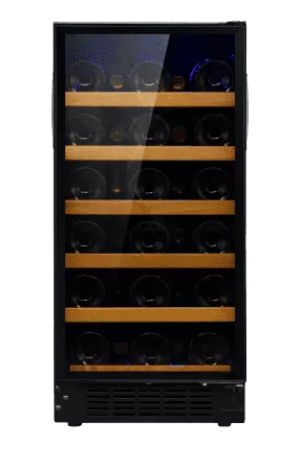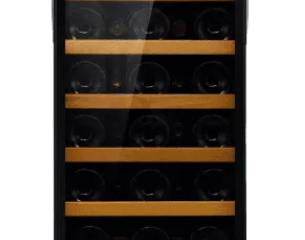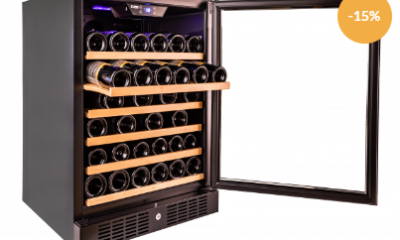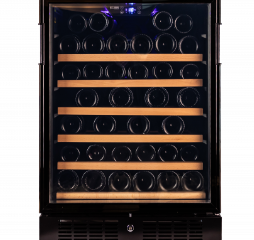Business
Unveiling the Ultimate Guide to Wine Coolers
Published
5 months agoon
By
Jeff bezos
Wine aficionados, rejoice! In the realm of viniculture, the significance of proper storage cannot be overstated. Whether you’re a seasoned sommelier or a budding enthusiast, investing in a Wine Cooler is paramount to preserving the integrity and flavor profile of your cherished vintages. But with a plethora of options saturating the market, navigating the landscape of wine coolers can be a daunting task. Fear not, for we’re here to demystify this enigmatic world and equip you with the knowledge needed to make an informed decision.
Understanding the Essence of Wine Coolers
Before delving into the intricacies of Wine Fridge Singapore, it’s imperative to grasp their fundamental purpose. A wine cooler, also known as a wine refrigerator or cellar, serves as a specialized storage unit designed to maintain optimal temperature and humidity levels for wines. Unlike conventional refrigerators, which operate at lower temperatures, wine coolers provide a climate-controlled environment conducive to the aging process, ensuring that your wines mature gracefully.
The Art of Temperature Control
Central to the functionality of wine coolers is the precise regulation of temperature. Maintaining stable temperatures is essential for preserving the delicate balance of flavors within each bottle. Ideally, wines should be stored at a consistent temperature ranging from 45 to 65 degrees Fahrenheit (7 to 18 degrees Celsius), depending on the varietal. Fluctuations in temperature can accelerate aging or, worse yet, lead to spoilage, rendering your investment futile.
Harnessing the Power of Humidity
In addition to temperature, humidity plays a pivotal role in wine storage. Optimal humidity levels prevent corks from drying out, which could compromise the integrity of the seal and expose the wine to oxidation. Wine coolers typically maintain humidity levels between 50% and 80%, safeguarding your collection against cork shrinkage and ensuring that each bottle ages gracefully.
Deciphering the Different Types of Wine Coolers
When embarking on your quest for the perfect wine cooler, you’ll encounter an array of options tailored to suit diverse preferences and requirements. From freestanding units to built-in models, the choices abound. Let’s explore some of the most prevalent types:
Freestanding Wine Coolers
As the name suggests, freestanding wine coolers offer unparalleled versatility, allowing you to position them anywhere in your living space without the need for installation. These standalone units are ideal for individuals seeking flexibility and convenience, as they can be easily relocated to accommodate evolving needs.
Built-In Wine Coolers
Contrary to their freestanding counterparts, built-in wine coolers are seamlessly integrated into cabinetry or countertops, exuding a sleek and sophisticated aesthetic. Perfect for modern kitchens or wine cellars, these built-in units blend seamlessly with their surroundings while providing efficient storage solutions for discerning oenophiles.
Dual-Zone Wine Coolers
For those with a diverse wine collection encompassing both reds and whites, dual-zone wine coolers offer the ultimate solution. These innovative appliances feature two distinct compartments with independent temperature controls, enabling you to store different varietals at their respective optimal temperatures. Say goodbye to sacrificing flavor nuances due to inadequate storage conditions!
Key Considerations When Purchasing a Wine Cooler
Armed with an understanding of the various types of wine coolers, it’s time to delve into the essential factors to consider before making your selection. From capacity and design to energy efficiency and noise levels, each aspect plays a crucial role in determining the suitability of a wine cooler for your specific needs.
Capacity
First and foremost, determine the desired capacity based on the size of your wine collection and future growth projections. Wine coolers are available in a range of capacities, from compact units capable of housing a dozen bottles to expansive models accommodating hundreds of bottles. Assess your storage requirements meticulously to avoid outgrowing your wine cooler prematurely.
Design and Aesthetics
Beyond functionality, the design of a wine cooler can significantly influence its visual appeal and integration into your living space. Whether you prefer a sleek stainless steel finish, a rustic wooden exterior, or a minimalist glass door, select a design that complements your existing decor and reflects your personal style. After all, your wine cooler should be as aesthetically pleasing as the wines it houses.
Energy Efficiency
In an era marked by environmental consciousness and sustainability, energy efficiency is a paramount consideration when choosing a wine cooler. Look for models equipped with advanced insulation and compressor technology, as these features contribute to reduced energy consumption and lower utility bills. Additionally, Energy Star-certified appliances adhere to stringent efficiency standards, ensuring eco-friendly operation without compromising performance.
Noise Levels
While functionality takes precedence, minimizing noise levels is crucial, especially if your wine cooler will be situated in a living area or entertainment space. Opt for units equipped with low-vibration compressors and noise-reducing components to maintain a serene ambiance conducive to relaxation and enjoyment.
Conclusion: Elevate Your Wine Experience with a Premium Wine Cooler
In summary, investing in a wine cooler is a testament to your dedication to preserving the essence and integrity of your cherished wines. By understanding the nuances of temperature control, humidity regulation, and storage options, you can embark on a journey of vinous exploration with confidence and sophistication. Whether you opt for a freestanding, built-in, or dual-zone model, the key lies in selecting a wine cooler that aligns with your preferences and enhances your overall wine experience.

Navigating Sri Lanka’s Visa Process: Understanding the Visa Eligibility Checker Tool

Understanding Sri Lankan Visa Requirements for French and Belgian Citizens

Navigating Sri Lankan Visa Requirements: A Guide for New Zealand Citizens and the Convenience of Online Applications

Exploring Sri Lanka: Visa Requirements for Danish and Canadian Citizens

Navigating Visa Requirements: Sri Lanka Transit Visa and Visa for Australian Citizens

How To Level Up Sign Language Competency

VIETNAM VISA ELIGIBILITY

Your Comprehensive Guide to Canada Tourist Visa

HOW TO GET CAMBODIA VISA FOR INDIAN CITIZENS

Indian Visa Application: A Step-by-Step Guide for Travelers

Navigating Sri Lanka’s Visa Process: Understanding the Visa Eligibility Checker Tool

Understanding Sri Lankan Visa Requirements for French and Belgian Citizens

Navigating Sri Lankan Visa Requirements: A Guide for New Zealand Citizens and the Convenience of Online Applications

Exploring Sri Lanka: Visa Requirements for Danish and Canadian Citizens







